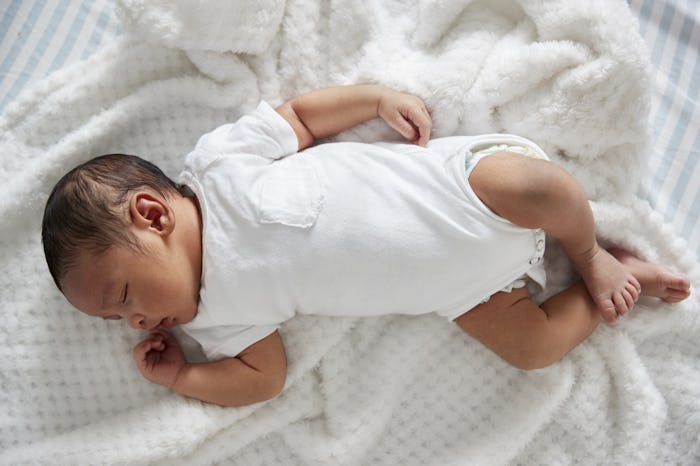Life

The Position Your Baby Should Be In When Sleeping
If you've spent any time around babies in the last decade, you've probably heard the ubiquitous "Back is Best" mantra that child safety experts have been repeating for years. Heck, some sleep sacks even have the saying embroidered on them. Still, sleep depravation can leave any new parent discombobulated, so it's more than normal to ask yourself, "Is it OK if my baby sleeps on their back?" every now and then. Rest assured, it truly is the safest way to put your baby to sleep.
For many years, parents were encouraged to have their babies sleep on their stomachs because, at the time, it was thought to decrease the risk of the baby choking and spitting up. But in 1994, the National Institute of Child Health and Human Development began the "Back to Sleep" campaign, encouraging parents to put their babies on their backs to sleep in order to reduce the risk of Sudden Infant Death Syndrome. This recommendation is credited with the subsequent drop in SIDS deaths by 50 percent.
According to the NICHD, until babies turn 1 year old they are at higher risk of SIDS if they are placed on their bellies for naps or nighttime sleep. Additionally, babies who are used to sleeping on their backs but are placed on their stomachs for a nap or nighttime sleep are at very high risk for SIDS.
Some parents have begun to buck the "Back to Sleep" recommendation, choosing to allow their babies to sleep on their tummies because they seem to sleep better and more soundly that way. It should be pointed out, however, that they are ignoring a major medical recommendation, risking the onset of SIDS so their baby can sleep more comfortably.
One way to encourage your baby to sleep on his or her back if they doesn't seem so inclined to do so, is to have him practice spending time on his back during awake time. According to the Baby Sleep Site, many babies don't like back sleeping because they can't curl up and get cozy the way they were used to snoozing in the womb, although swaddling can replicate that cozy feeling and help back sleepers stay asleep. If your baby struggles with reflux and spit up, you can place a rolled blanket under the mattress to elevate one end and help baby from the pain of reflux.
If your baby is old enough to roll and always prefers to roll to her stomach for sleep, that proves a lesser risk for SIDS than a brand new baby who can't adjust their position themselves. What To Expect explains, "Babies who can roll themselves over are at a significantly decreased risk of SIDS, which experts believe is because babies with that ability have also developed the maturity to sense trouble during sleep and move into a safer position."
Sleep is rare, usually stressful, and far more complicated when you're a new parent, so take your wins when and where you can. A sure win? Having your baby sleep on his or her back. Always.